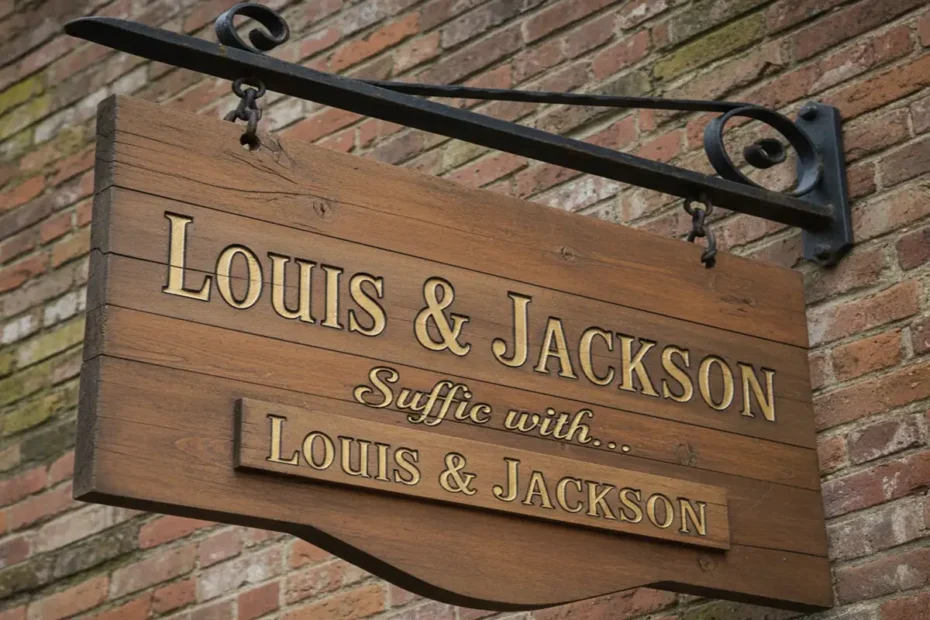Language is full of interesting patterns, and sometimes, even the simplest words can spark curiosity. One such phrase that has drawn attention is “suffix with Louis and Jackson.” At first glance, it seems like a grammar puzzle, but when explored deeper, it reveals fascinating connections involving names, culture, language, and how we form meaningful combinations from simple words.
What Does “Suffix with Louis and Jackson” Mean?
To understand suffix with Louis and Jackson, we first need to look at what a suffix is. In English, a suffix is a word or set of letters added to the end of another word to create a new meaning. However, in this context, the phrase suffix with Louis and Jackson suggests a word that commonly follows both “Louis” and “Jackson” to form familiar combinations.
When you think of “Louis” and “Jackson,” what commonly comes after them? Words like “ville,” “iana,” “son,” or “land” can come to mind. These suffixes help form names such as Louisville, Louisiana, Jacksonville, and Jacksonian. So, the idea of a suffix with Louis and Jackson is truly about how a single word or ending connects to both of these names in various ways.
Famous Examples of Suffix with Louis and Jackson
One of the most recognizable examples is “ville.” When added as a suffix with Louis and Jackson, it creates two widely known cities, Louisville in Kentucky and Jacksonville in Florida.
-
Louis + ville = Louisville
-
Jackson + ville = Jacksonville
Another example involves the suffix “ian” or “iana,” especially used to describe people or things related to a place or person.
-
Louis + iana = Louisiana
-
Jackson + ian = Jacksonian
These instances show how the phrase suffix with Louis and Jackson connects geography, culture, and history through language.
Historical and Cultural Significance
Both Louis and Jackson are names deeply rooted in history. The name Louis has French origins and has been carried by many kings of France. The American state Louisiana was named in honor of King Louis XIV of France. Here, the suffix with Louis and Jackson connects language to colonial history and monarchy.
Jackson, on the other hand, is a name strongly linked with the United States think of President Andrew Jackson or the globally renowned entertainer Michael Jackson. When we talk about suffix with Louis and Jackson, we’re also exploring how names become legacies and evolve into cities, states, and even cultural movements.
Linguistic Patterns Behind the Phrase
In linguistics, adding a suffix to a name is a creative way of forming new words, places, or identities. The idea of a suffix with Louis and Jackson reflects how language adapts over time. Suffixes like “ville,” “ton,” and “land” have roots in old English, French, or German languages, yet they remain active in modern vocabulary.
| Name | Suffix | Result |
|---|---|---|
| Louis | -ville | Louisville |
| Jackson | -ville | Jacksonville |
| Louis | -iana | Louisiana |
| Jackson | -ian | Jacksonian |
These examples make the phrase suffix with Louis and Jackson easier to understand while highlighting its linguistic importance.
Why This Phrase Matters Today
You may wonder why the phrase suffix with Louis and Jackson is relevant in modern times. In digital content creation, SEO strategies, and cultural studies, people often explore how names, places, and language connect. Understanding how suffixes modify names, such as Louis and Jackson, helps writers, researchers, and students create accurate and engaging content.
Conclusion
The phrase suffix with Louis and Jackson may look simple, but it opens doors to intriguing linguistic, historical, and cultural discussions. From cities like Louisville and Jacksonville to historical terms like Louisiana and Jacksonian, suffixes help create identity and meaning.
So, next time you come across a place name or cultural phrase, remember that something as simple as a suffix with Louis and Jackson could have shaped its origin.
FAQs
1. What does the phrase “suffix with Louis and Jackson” mean?
The phrase refers to common word endings or suffixes that can be added to both names Louis and Jackson to form well-known place names or terms like Louisville and Jacksonville.
2. What is the most common suffix with Louis and Jackson?
One of the most common is “-ville,” which creates the names Louisville and Jacksonville.
3. Can suffix with Louis and Jackson be related to geography?
Yes, many examples like Louisville, Louisiana, and Jacksonville are names of cities or regions formed by adding a suffix with Louis and Jackson.
4. What are other examples of suffix with Louis and Jackson besides “-ville”?
Examples include “-iana” in Louisiana and “-ian” in Jacksonian.
5. Why is suffix with Louis and Jackson important in language or history?
It shows how names evolve into places, cultural terms, and historical references by simply adding meaningful suffixes.
